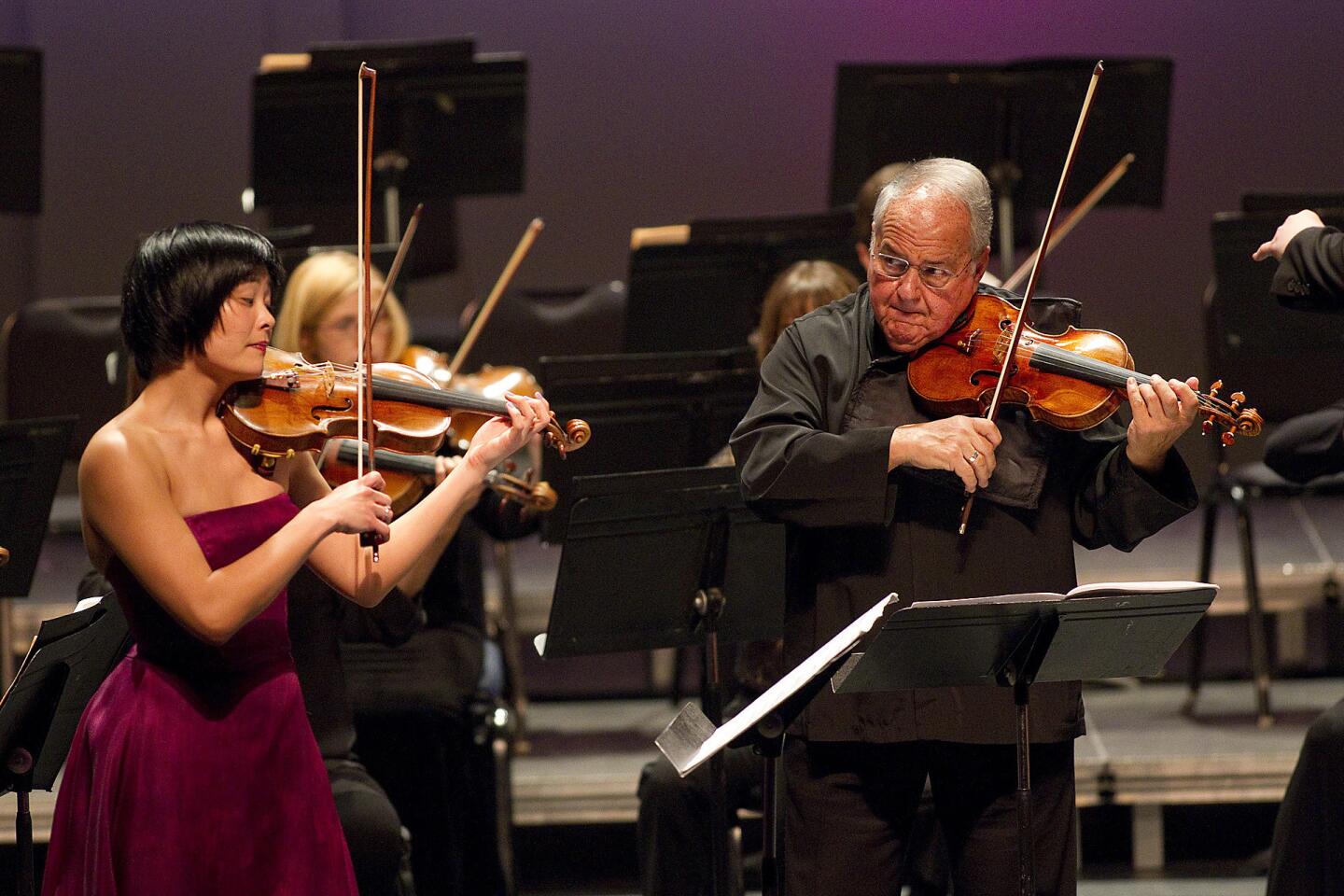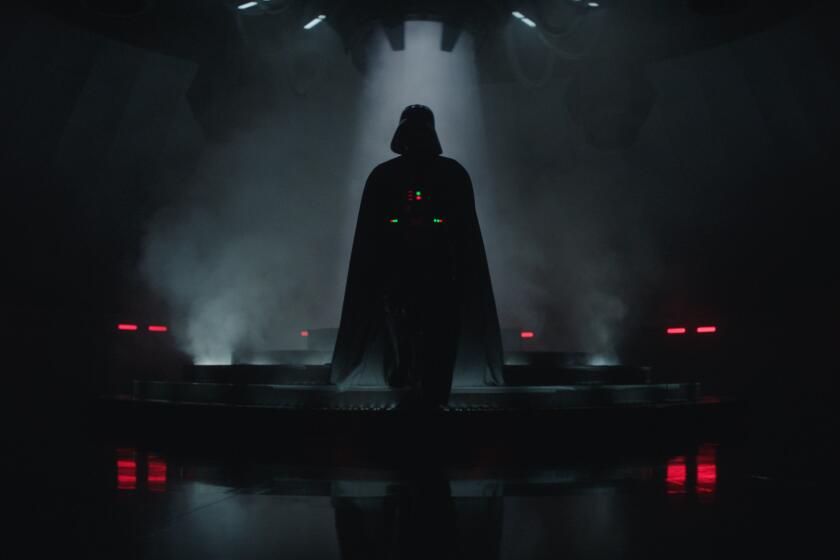Review: L.A. Chamber Orchestra in the ‘Clouds’ with Jennifer Koh
- Share via
Five years ago in early spring, Esa-Pekka Salonen devoted his last Green Umbrella concert as music director of the Los Angeles Philharmonic to new works from emerging composers. One was a 29-year-old British composer who had joined the blossoming Brooklyn scene in New York. Anna Clyne’s “Within Her Arms” for string chamber orchestra had the feel of wholesome traditional British string music enlivened by a new spirit. Clyne seemed a find.
Jennifer Koh, a young American violinist coming into her own and who happened to have just recorded a solo violin piece by Salonen, heard “With Her Arms” and immediately decided she wanted a piece by Clyne. That piece is now “Prince of Clouds,” a concerto for two violins and, once more, a small string ensemble. It was given its West Coast premiere by the Los Angeles Chamber Orchestra on Saturday night at the Alex Theatre in Glendale. Koh and the veteran violinist Jaime Laredo were soloists. Clyne remains a find.
Clyne and Koh have in fact grown exponentially in importance. Clyne is a Chicago Symphony composer in residence. Koh has become one of the most impressive and expressive violinists on the scene, and she has developed a rare stage presence being honed by director Robert Wilson. She was a sensation as the violin-playing Einstein in Los Angeles Opera’s production of the Wilson and Philip Glass opera “Einstein at the Beach” last fall.
SPRING ARTS 2014: Classical music picks
Koh has a slew of projects built around Bach. She and Wilson are developing something. She has been giving solo recitals of Bach and contemporary music. (Her next installment of “Bach and Beyond” will be in Santa Barbara as part of UCSB’s Arts & Lectures on April 23.) And with Laredo, who was her teacher, she has instigated “Two x Four.” Together they are premiering three works commissioned as companions to Bach’s Concerto for Two Violins. That is where Clyne comes in (along with Glass and David Ludwig).
“Prince of Clouds,” Clyne’s first concerto, had its first performance in Germantown, Tenn., at the end of 2012 and has had a number of performances on the East Coast and in Chicago. Like “Within Her Arms,” the score is within her arms, which is to say that it has an enveloping quality. It begins with sweet, serene, intertwining violin solos, soon embraced by a sweet, intertwining string section.
It is lovely music, slightly too lovely and thus interrupted by harshness. Brutal, raspy percussive interludes appear suddenly, like slashes of the knife on the music, but sweet melody always returns, swooping with ever more determination. There is never resolution. Balance is gained, lost and regained, never maintained.
PHOTOS: Arts and culture in pictures by The Times
And that makes the sweet stuff start to sound strange, especially late in the 14-minute piece as uncentered phrases rise to a climax. In the score, Clyne gives the players alluringly contradictory instructions, such as “beautiful with unease,” which pretty much sums up “Prince of Clouds.”
The performance was stunning, helped not only by the soloists but also a young conductor who, like the concerto, was making a West Coast debut. James Feddeck, a former assistant conductor of the Cleveland Orchestra, cheerfully encouraged Clyne’s soaring lyricism and just as cheerfully her violent interruptions.
The Bach Double Concerto that followed was not conducted. A Koh-Laredo show, she played the frisky young woman now the master of the stern (if good-humored) master. In the wondrous slow movement, they were like jazz musicians in the back-and-forth passages. She phrased with bouncing embellishment. Laredo, whose Bach eccentricity has authority — he recorded Bach’s violin sonatas with Glenn Gould — was staunch, down-to-earth. The result was both riot and delight.
Youth of course won out. And youth was the point of an evening that began with Mendelssohn’s “The Fair Melusina” Overture, written when the composer was 23, and ended with Schubert’s Third Symphony, the work of an 18-year-old.
CRITICS’ PICKS: What to watch, where to go, what to eat
Mendelssohn’s overture is rarely played. Its watery figurations were an innovation in the early 19th century but then Wagner adopted them with far more novelty in “Das Rheingold,” making “Fair Melusina” sound rudimentary to Wagnerian ears.
Schubert’s tunefully made symphony is excellent adolescent music. You recognize the composer. The spirits are high. But like “Fair Melusina,” this is music hard not to hear through ears that know what would come next, ears, in this case, attuned to the kind of greatness the precocious Schubert would soon achieve.
To Feddeck’s credit, he trusted the music. He has a lyrical gift and the right enthusiasms. He did nothing fancy. Best of all he trusted LACO, which meant the playing was resplendent all evening.
More to Read
The biggest entertainment stories
Get our big stories about Hollywood, film, television, music, arts, culture and more right in your inbox as soon as they publish.
You may occasionally receive promotional content from the Los Angeles Times.














